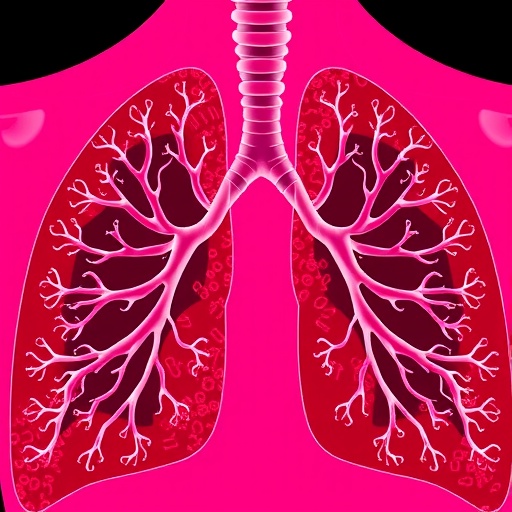(Barcelona, Spain — September 9, 2025) — At the forefront of oncological research, a groundbreaking study revealed at the International Association for the Study of Lung Cancer (IASLC) 2025 World Conference on Lung Cancer has illuminated promising horizons for patients battling advanced non-small cell lung cancer (NSCLC). This latest research centers on CAN-2409, an innovative experimental viral immunotherapy designed to invoke a powerful and sustained immune response even in patients who exhibited resistance to conventional immune checkpoint inhibitors (ICI). The study’s revelations may well herald a paradigm shift in the treatment landscape for this aggressive cancer subtype.
CAN-2409 is a novel therapeutic approach that integrates virotherapy and gene therapy principles, applying a non-replicating adenoviral vector to deliver herpes simplex virus thymidine kinase (HSV-tk) selectively into tumor cells via direct intratumoral injections. Once inside the cancer cells, the administration of the oral prodrug valacyclovir is activated by HSV-tk, converting it into toxic metabolites that induce immunogenic cell death. This process not only eradicates tumor cells locally but also primes the patient’s immune system to recognize and fight cancer systemically. The phase 2a clinical trial sponsored by Candel Therapeutics rigorously investigated this approach in patients with unresectable stage III/IV NSCLC who had previously failed to respond adequately to immune checkpoint inhibitors, a group traditionally with limited therapeutic options.
The trial enrolled 76 patients stratified into two cohorts based on disease status at baseline: those with stable disease post-ICI therapy and those exhibiting progressive disease despite such treatment. Of those, 46 patients met eligibility criteria for primary analysis, constituting the per protocol population. Over a median follow-up period extending beyond 32 months, the study uncovered that the median overall survival (OS) reached 24.5 months across this cohort—a remarkable outcome considering the refractory nature of the patient pool. Notably, 37 percent remained alive more than two years after treatment initiation, an unprecedented figure in this heavily pretreated population.
Patients displaying progressive disease at enrollment still demonstrated encouraging results, with a median OS of 21.5 months following CAN-2409 therapy. This finding underscores the potential of CAN-2409 to overcome the therapeutic resistance frequently observed in this subgroup. Dr. Charu Aggarwal of the Abramson Cancer Center at the University of Pennsylvania emphasized that this represents a meaningful advancement in durable survival outcomes for patients who otherwise face grim prognoses.
An intriguing nuance of the study lies in the differential immunological and clinical outcomes observed between tumor histologies. Patients with non-squamous NSCLC showed significantly longer median overall survival compared to their squamous counterparts—25.4 months versus 13.3 months respectively. This disparity was correlated with a robust increase in cytotoxic effector T-cell infiltration within the tumor microenvironment following treatment, indicating a favorable modulation of anti-tumor immunity. These immunological signatures provide compelling evidence for the mechanism of CAN-2409’s efficacy and may guide future precision medicine applications within lung cancer therapy.
Beyond localized tumor control, the study documented systemic immune activation characterized by abscopal responses in 69 percent of patients presenting with multiple tumor lesions. The abscopal effect refers to the regression of untreated metastatic lesions distant from the site of local therapy, suggesting that intratumoral administration of CAN-2409 triggers a profound systemic immune response. This phenomenon elevates the therapeutic potential of virus-mediated immunotherapy by converting the tumor itself into an in situ cancer vaccine, capable of mobilizing widespread host immune defenses.
Safety and tolerability remain paramount when considering novel oncologic agents. Throughout the extended follow-up, CAN-2409 continued to demonstrate a favorable safety profile with manageable adverse events, reinforcing its promise as a viable therapeutic candidate. The preservation of quality of life alongside improved survival metrics is particularly encouraging for patients with advanced, treatment-resistant malignancies.
The sustained clinical benefit and immunomodulatory capacity of CAN-2409 affirm its candidacy for further evaluation in larger, randomized controlled trials. Dr. Aggarwal advocates for prioritizing patients with non-squamous histology in forthcoming studies, given their pronounced survival advantage and immunologic responsiveness. Such trials would not only cement the therapeutic role of CAN-2409 but also help establish biomarkers for patient selection, ultimately enhancing personalized treatment algorithms.
This study exemplifies the evolving intersection of virology, immunology, and oncology, showcasing how engineered viral vectors can be harnessed to selectively target and dismantle tumors while simultaneously galvanizing the immune system. In an era where immune checkpoint inhibitors revolutionized cancer therapy, CAN-2409 represents a promising complementary modality poised to extend benefits to patients who do not adequately respond to existing immunotherapies.
The International Association for the Study of Lung Cancer (IASLC), built on a mission to unite lung cancer specialists worldwide, served as the ideal platform to disclose these insightful findings. The IASLC’s annual World Conference on Lung Cancer remains the largest and most comprehensive congregation of multidisciplinary experts dedicated to lung and thoracic cancers, fostering knowledge exchange and catalyzing innovation that could transform patient outcomes globally.
As the oncology community awaits subsequent trial results and expanded data analyses, CAN-2409 stands out as a beacon of hope, potentially rewriting the prognosis for many affected by advanced NSCLC. The integration of viral immunotherapy into standard treatment paradigms could signify a transformative leap forward, merging local tumor targeting with systemic immune engagement to achieve durable remissions. With continued research and collaboration, this approach may soon redefine therapeutic frontiers in lung cancer care.
Subject of Research: Experimental viral immunotherapy CAN-2409 in advanced non-small cell lung cancer (NSCLC) resistant to immune checkpoint inhibitors.
Article Title: Encouraging Long-Term Survival Outcomes with Viral Immunotherapy CAN-2409 in Advanced NSCLC Post-Checkpoint Inhibitor Failure.
News Publication Date: September 9, 2025
Web References: www.iaslc.org
Keywords: lung cancer, non-small cell lung cancer, viral immunotherapy, CAN-2409, immune checkpoint inhibitors, immunotherapy resistance, virotherapy, cytotoxic T cells, abscopal effect, advanced NSCLC, clinical trial, tumor microenvironment
Tags: advanced non-small cell lung cancer treatmentCAN-2409 clinical trial resultsCandel Therapeutics research innovationsHSV-tk gene therapy applicationimmune checkpoint inhibitors resistanceimmunogenic cell death mechanismintratumoral injection cancer treatmentnovel immunotherapy for NSCLCphase 2a clinical trial oncologysystemic immune response in cancertargeted cancer therapies for NSCLCviral immunotherapy for cancer





